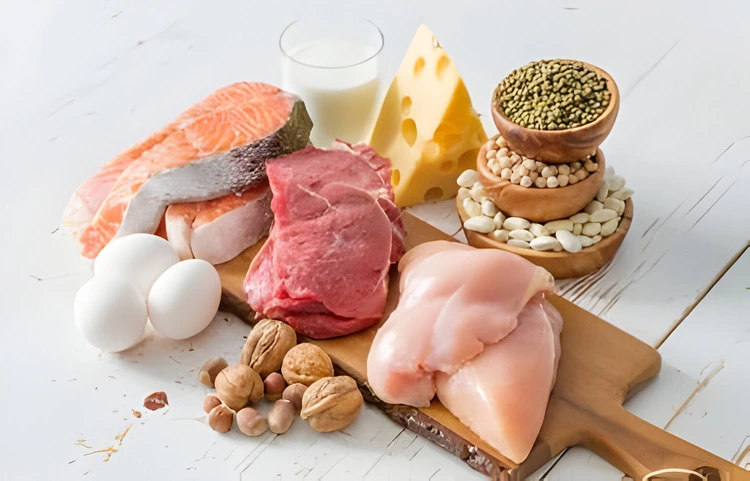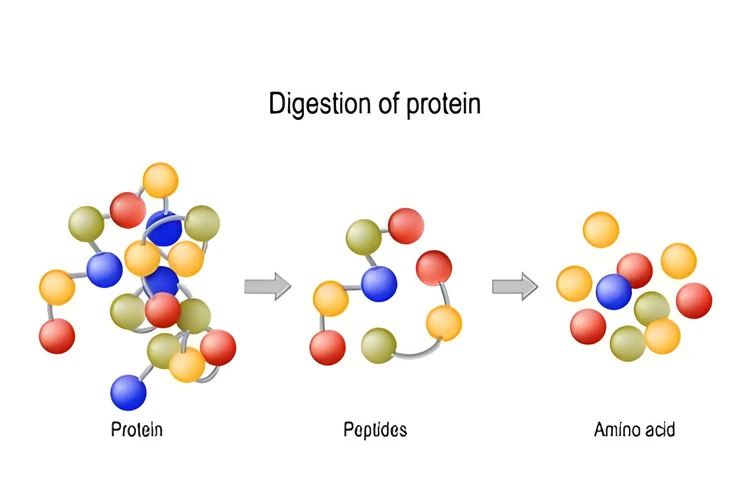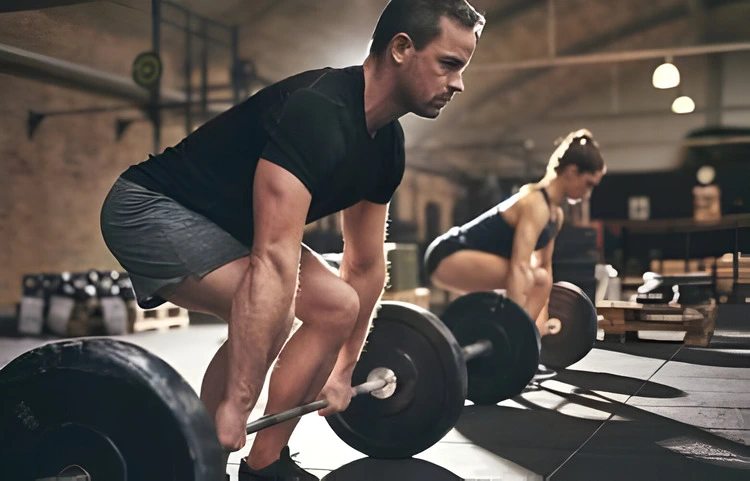Protein absorption is critical for getting the most out of your protein intake. But, do you ever feel like you’re eating enough protein yet not seeing the results you want? If so, you might not be absorbing it efficiently.
Protein is vital for muscle growth, tissue repair, and overall health. However, if your body doesn’t correctly break down and absorb protein, you’re missing out on its full benefits. This can leave you feeling frustrated and wondering how to optimize your nutrition.
Understanding protein absorption is the key to maximizing your nutrition! Learn the ins and outs of protein digestion and absorption, what factors affect this process, and how to improve your body’s ability to utilize this essential nutrient.
Ready to unlock the full power of your protein intake?
Protein Absorption: In a Nutshell
- Protein = building blocks
- Digestion breaks protein into amino acids
- Amino acids used for everything
- Many factors affect absorption
- Optimize absorption for best results
Table of contents
Introduction

Understanding Protein Absorption: The Key to Maximizing Your Nutrition
Think your protein shake is fueling your gains? Is that plant-based protein doing its job? Before you reach for another scoop, let’s talk about protein absorption. It’s not just about what you eat, but how your body actually uses it.
The Basics of Protein Absorption
Protein builds, repairs, and powers your body. It’s a chain of little powerhouses called amino acids. Some proteins give you the full set of amino acids (think meat, eggs, dairy), others are missing a few links.
Want to get the most out of your protein intake? Here’s what you need to know:
- Complete proteins: These have all the essential amino acids your body can’t make.
- Incomplete proteins: They’re missing a few essential links, but don’t worry! Smart combinations can still rock your protein goals.
And hey, ever wondered how protein becomes those rock-hard muscles? That’s where protein absorption comes in! Think of it as the secret to unlocking the power of your protein shake.
Let me know if you’re curious about the fascinating journey protein takes through your body. I’m excited to dive into it next! #proteinpower #nutritiontalk
Think you know everything about protein? You might be surprised by the fascinating journey it takes through your body. My ‘Protein Digestion 101‘ article reveals some unexpected twists and turns.
The Protein Digestion Journey
Step 1 – It Starts in the Mouth
Think of your teeth as the first line of defense in protein absorption. With every bite, you mechanically break down food.
Chewing well matters! Does thorough chewing really help with digestion? Absolutely–it increases surface area for your body’s powerful enzymes to work their magic.
Step 2 – The Stomach’s Power
Now, imagine your stomach as a super-acidic protein-busting machine. Special cells release hydrochloric acid, creating the perfect environment for the enzyme pepsin. Pepsin gets to work, breaking down those long protein chains into smaller pieces called polypeptides.
- Fun fact: Did you know an adult stomach can hold about a gallon of food and liquid?
Step 3 – The Small Intestine: Where the Magic Happens
This is where protein absorption really kicks into high gear! Your pancreas, the superhero organ, releases a whole squad of enzymes known as trypsin and chymotrypsin. These enzymes continue breaking down those polypeptides.
But wait, there’s more! Tiny, finger-like projections in your small intestine, called brush border enzymes, finish the job. They break polypeptides into individual amino acids or smaller chains that your body can easily absorb.
- Here’s where we link out: Some plant foods contain compounds called inhibitors that can hinder this process. Learn more about the impact of dietary inhibitors on protein absorption and how to mitigate their effects.
Amino acids need a way in, right? Special transporters within your gut wall shuttle these valuable nutrients into your bloodstream. From there, they embark on their mission to build and repair your body!
How Your Body Uses Amino Acids
Think of amino acids as the ultimate construction crew for your body. They’re constantly at work, building and repairing everything! So, what exactly do they do?
Muscle Power Ever wonder how muscles get stronger after a workout? Amino acids are the key! They rebuild muscle fibers and help them grow. Protein absorption directly impacts how well your body can maintain and build muscle mass.
The Body’s Support System Amino acids don’t just work on muscles. They create the enzymes needed for digestion and the hormones that regulate all sorts of things like mood and sleep. They even contribute to a strong immune system!
Beyond Building Did you know amino acids can be used for energy? That’s right, if needed, your body can turn them into fuel. Is there anything they can’t do? Additionally, they can be converted into glucose for a quick energy boost or transformed into fat for long-term storage.
Amino Acids in Action: A Snapshot
- Tissue Repair: Essential for wound healing and cell growth
- Neurotransmitter Creation: Support healthy brain function
- Nutrient Transport: Help carry vitamins and minerals around your body
Let me know – what surprises you most about how your body uses amino acids? Have you seen a difference in your energy or muscle recovery since paying attention to protein absorption? Share your experiences below!
Factors Affecting Protein Absorption

What Helps, What Hinders
Think of your digestive system as a complex machine working to break down protein. Some factors boost its efficiency, while others can throw a wrench in the works.
Let’s dive into what influences your body’s ability to unlock the goodness within your protein sources.
The Good
- The Type Matters: Animal-based protein sources (meat, fish, eggs, dairy) tend to be more easily absorbed than plant-based ones.
- Is this a reason to ditch the plants? Absolutely not! With a little know-how, you can maximize protein absorption from those beans and lentils too.
- Cooking to the Rescue: Cooking your food can make protein easier to digest. Heat helps break down some of the tough structures found in protein sources.
- A Healthy Gut = Happy Protein: A healthy digestive system is your protein absorption powerhouse. A balanced gut microbiome aids in the breakdown and absorption of those precious amino acids.
The Challenges
- Age Matters: As we age, our digestive capacity naturally decreases. This can make protein absorption a little less efficient.
- When Your Gut Isn’t Happy: Medical conditions affecting the intestines, like Crohn’s disease or celiac disease, can significantly hinder protein absorption.
- Don’t Forget the Inhibitors: Certain compounds in plants, like tannins and phytates, can bind to protein, making it harder to digest. Want to learn some tricks to reduce these inhibitors? Check out this resource on the impact of dietary inhibitors on protein absorption.
- The Fiber Factor: Fiber is fantastic for health, but very high-fiber meals consumed right alongside protein sources might slightly slow protein digestion.
How to Maximize Your Protein Absorption
Want to get the most out of your protein shakes and meals? It’s not just about what you eat, but how well your body absorbs those muscle-building nutrients. Let’s dive into ways to supercharge your protein absorption!
Dietary Tips
- Combine and conquer: Are you a fan of plant-based protein? Mixing and matching your sources – think beans and rice, or hummus with whole-wheat pita – unlocks a complete amino acid profile. This ensures you get all the essential building blocks your body craves.
- Soak, sprout, ferment: These strategies can help break down anti-nutrients in foods like grains and legumes. Is a reduced level of anti-nutrients good for protein absorption? You bet!
- A touch of Vitamin C: Pair your protein sources with foods rich in Vitamin C, like citrus fruits or bell peppers. This helps enhance the absorption of iron, often found alongside protein.
Lifestyle Factors
- Slow down, savor the flavor: Chewing your food thoroughly is crucial! It kickstarts the digestive process and makes protein easier to break down.
- Chill out: Stress isn’t your friend, especially when it comes to digestion. Finding healthy stress management techniques can make a world of difference in protein absorption.
- Stay hydrated: Water is essential for smooth digestion and optimal nutrient transport. Aim to drink enough fluids throughout the day.
Special Considerations
Athletes and Protein Absorption
Are you an athlete or fitness enthusiast? Protein absorption is essential for you. Your body needs extra protein to repair and rebuild muscles after those tough workouts. So, when’s the best time to get your protein fix, and what types are ideal?
- Timing Matters: Aim to fuel with protein before and after workouts for optimal muscle recovery.
- Protein Power: Whey protein is a fast-digesting star for post-workout, while casein offers a slower release, making it great before bed.
Protein Absorption for Seniors
As we age, our digestive systems may not work as efficiently. Does this mean you should cut back on protein? Absolutely not! Here’s how to ensure you’re still getting the protein you need for healthy muscles and overall well-being:
- Focus on Digestibility: Opt for easily digestible protein sources like eggs, fish, or a reputable protein supplement designed for seniors.
- Smaller, More Frequent Meals: This approach can ease digestion and improve protein absorption.
- Talk to Your Doctor: If you’re struggling with digestion, a healthcare professional can help personalize a plan and check for any underlying issues impacting your protein absorption.
Vegetarians, Vegans, and Protein
Getting enough protein on a plant-based diet is totally doable – it just takes a bit of planning. Is combining plant proteins the secret? Yes! Here’s why:
- The Amino Acid Mix: Different plant proteins offer varying amino acid profiles. Strategically combine sources (think beans and rice) to create complete proteins.
- Let’s Talk Supplements: A high-quality vegan protein supplement can be a lifesaver if you find it tricky to get your amino acids from food alone. For advice on choosing the right ones, consider consulting with a registered dietitian who specializes in plant-based diets a registered dietician who specializes in plant-based diets”
- Don’t Forget Variety: Eating a wide range of plant proteins naturally helps you get a complete amino acid profile.
Tell us – are you a plant-based superstar or just exploring? Share your favorite protein combos in the comments, or tag us on social!
Ready to supercharge your results with protein? Whether you’re looking to build muscle, boost energy, or simply eat healthier, plant-based protein sources offer amazing benefits. Let’s dive in!
Conclusion

Think you’re set with protein just because you eat it? Think again! Protein absorption is where the real magic happens. Did you know your body might not be fully benefitting from all that chicken or tofu?
So, how can you ensure you’re reaping those muscle-building, energy-boosting rewards? Here are a few key takeaways:
- Prioritize whole foods. While supplements can be helpful, focus on getting most of your protein from diverse whole food sources.
- Optimize your digestion. A healthy gut is crucial for proper protein absorption. Explore strategies to improve your gut health through diet or a consultation with a healthcare practitioner.
- Consider those dietary details. The way you prepare and combine your foods can significantly affect how well your body utilizes protein.
Is there more to learn? Absolutely! The world of protein absorption is fascinating and complex.
If this article has sparked your interest, let’s keep the conversation going! Feel free to comment below or tag me on social media with your own protein-powered questions and success stories.
Remember, knowledge is power. The more you understand about nutrition, the better equipped you’ll be to make choices that fuel your best self!
Protein Absorption: Your Questions Answered
Protein is broken down into amino acids in the stomach and small intestine. These amino acids are then absorbed into the bloodstream for use by your body.
Your body will likely use some of the protein and store the rest for later. However, consistently eating this much in one sitting can strain your digestive system over time.
For most people, no. However, it depends on your individual needs and activity level. It’s best to spread protein intake throughout the day.
Consider if you’re constantly fatigued, have slow muscle recovery, or notice declining hair and skin health. These could signal a need for more protein.
Yes, excess protein can strain your kidneys and lead to dehydration. Aim for balanced protein intake throughout the day.
Whole foods generally offer more complete nutrition. Protein powders can be convenient, but choose high-quality options for optimal protein absorption.
Yes, conditions like IBS or Crohn’s can impact protein absorption. Consult with a doctor or dietitian for personalized guidance.